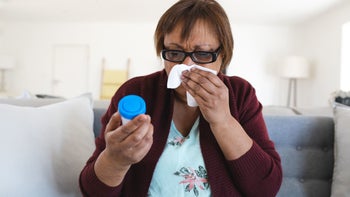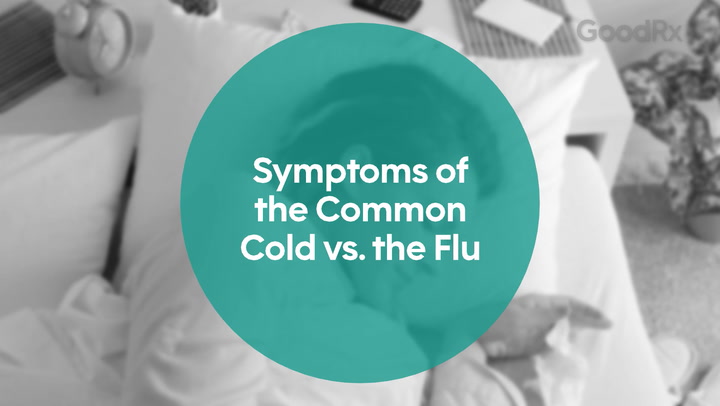
Does the Flu Cause Diarrhea? Yes, Here’s Why It Happens
Key takeaways:
Diarrhea can be a symptom of influenza. But it’s less common than other flu symptoms like fever, cough, stuffy nose, and headache.
Children are more likely to have diarrhea if they’re sick with the flu. Adults can have diarrhea, too, but it’s not common.
The best treatments for flu-related diarrhea include drinking plenty of fluids and avoiding foods that can irritate the gut like spicy or fatty foods.

Having the flu is never easy. Flu symptoms are notoriously tough to deal with and they can linger for 7 to 10 days.
You may be familiar with common flu symptoms like fever, fatigue, stuffy nose, and cough. But if you’ve also been experiencing stomachaches, diarrhea, and nausea, you might be wondering if the flu is to blame or if you’ve somehow come down with another illness at the same time.
It turns out the flu can cause diarrhea. If you’ve been experiencing diarrhea along with flu-like symptoms, here’s what you should know about flu-related diarrhea and how to treat it.
Is diarrhea a symptom of the flu?
Yes, diarrhea can be a symptom of the flu. But it’s not very common.
Children are more likely to develop symptoms like diarrhea, nausea, and vomiting when they’re sick with the influenza virus, which is the virus that causes the flu.
This trend has been reported in medical literature for decades. Children who get sick with influenza B, one of the major strains of influenza virus, are more likely to develop vomiting and diarrhea than children who get sick with influenza A, the other major strain of the influenza virus.
In studies, about 10% to 15% of children who came down with influenza B develop diarrhea and other gastrointestinal symptoms. Children who are sick with influenza A can also develop diarrhea, but it’s not as common.
In general, diarrhea and other gut symptoms are pretty uncommon in adults who were sick with the flu. But it can happen, especially in adults who are sick with influenza B and certain strains of influenza A. For example, during the 2009 H1N1 pandemic, 3% of adults reported diarrhea and other gastrointestinal symptoms. And cases were high again during the 2014-2015 flu season when H3N2 influenza A dominated the flu season.
In general, most adults are unlikely to get diarrhea with the flu. But this can vary from year to year depending on which strains of the flu are circulating in the community. Children are more likely to develop diarrhea with the flu, especially if they’re sick from an infection with influenza B.
Why does the flu cause diarrhea?
It’s not clear why the flu causes diarrhea. The influenza virus directly attacks the upper respiratory tract. Sometimes, the virus attacks the lower respiratory tract, too. That’s why you develop respiratory symptoms like cough, congestion, and stuffy nose when you’re sick with the flu.
But there’s no clear evidence that the influenza virus also attacks the gastrointestinal tract. So the exact reason you get diarrhea with the flu remains a mystery. Scientists have put forth a couple of possible explanations:
Cytokine release: Cytokines are proteins that send signals to your immune system and trigger your inflammatory response. Your body releases cytokines when you’re sick. They’re partially responsible for flu symptoms like headaches, fatigue, muscle aches, and fever. It’s possible that this release triggers symptoms like diarrhea, too.
Flu medications: Oseltamivir (Tamiflu) and baloxavir marboxil (Xofluza) are oral medications that are approved by the FDA to treat influenza infections. While these medications can prevent serious flu-related illness, they can also cause side effects, including diarrhea. People taking one of these medications may develop diarrhea and think that the symptom is from their influenza illness, when it’s really from the medication. This is a common mistake because these medications work best if they’re started within 48 hours of getting sick with the flu. At that point, you may still be developing new flu symptoms, so it can be hard to know if it’s the virus or the medication that’s causing your symptoms.
COVID-19: You can get sick with influenza and COVID at the same time. This co-infection is so common that people have dubbed it “fluorna.” COVID and flu can cause similar symptoms so it can be hard to tell when you have both at the same time. But one major difference between the two is that diarrhea is a common symptom of COVID. So if you know you have the flu but also have diarrhea, it’s worth taking a COVID test to make sure you don’t have COVID, too.
How long can influenza diarrhea last?
It depends. Most flu symptoms last between 2 and 5 days. But symptoms can last longer, especially if you have a weakened immune system.
Flu-related diarrhea usually goes away along with your other flu symptoms. Sometimes diarrhea resolves earlier than other symptoms.
How is the stomach flu different from the flu?
Influenza, also called “the flu” for short, is the illness caused by the influenza virus. The “stomach flu” is a term used to describe gastroenteritis. Gastroenteritis is an infection of the gastrointestinal tract. It can be caused by several types of viruses, bacteria, and parasites.
Symptoms of the stomach flu (gastroenteritis) and the flu (influenza) can overlap. Both illnesses can cause headaches, fatigue, stomachache, and make you feel sick and weak. Both illnesses can also cause nausea, vomiting, and diarrhea, though these symptoms are very common with the stomach flu and not so common with the flu.
But that’s all they have in common. These conditions are caused by different viruses, and they spread from person to person in different ways. They also need different treatments. So despite their similar names, they’re very different medical conditions.
How do you treat flu-related diarrhea?
It’s important to take action if you have flu-related diarrhea. Flu-related diarrhea can quickly lead to dehydration, especially in young children and older adults. Here’s how you can treat flu-related diarrhea at home:
1. Drink plenty of fluids
It’s important to drink plenty of fluids to avoid dehydration. Extra fluids will replace the fluids your body is losing from diarrhea and fever. The best drinks for diarrhea include water, drinks that contain electrolytes (Pedialyte, Gatorade), broth, and no-pulp fruit juice.
Avoid alcohol and caffeine, which can make you pee more often and increase your risk of dehydration. Sugary beverages and milk can sometimes worsen diarrhea, too, so avoid these until you’re recovered.
2. Choose light foods
You don’t have to follow a special diet when you have diarrhea. But you might find that avoiding certain foods can be easier on your stomach when you’re sick with flu-related diarrhea.
Try to avoid fried, fatty, and spicy foods. Some people find that bland foods are easier to eat when they feel sick and don’t make their diarrhea worse.
You can try following the BRAT diet for a few days. The BRAT diet focuses on bland foods that are easy to digest, such as white bread, plain pasta or white rice, plain crackers, broth, applesauce, and cooked cereals. While these foods might not upset your stomach, they’re also not high in fiber or vitamins. So make sure to go back to your usual, varied diet once you start feeling better.
3. Try over-the-counter medications
You can also try an over-the-counter (OTC) probiotic supplement when you’re sick with diarrhea. Probiotics contain live bacteria and yeast that may help keep your gut healthy. There’s no evidence that probiotics can make diarrhea go away faster, but some people feel better after taking them.
You can also try taking loperamide (Imodium), an OTC medication that slows how fast stool moves through your intestines. Loperamide isn’t recommended for infants and children.
The bottom line
The flu is a respiratory illness caused by the influenza virus. Common symptoms of the flu include fever, cough, congestion, and headaches. But the flu can also cause diarrhea and other gastrointestinal symptoms. Children are more likely to experience diarrhea with the flu than adults. Flu-related diarrhea will go away over a few days, along with other flu symptoms. Treatment for flu-related diarrhea includes drinking plenty of fluids and eating light and bland foods.
References
Cao, B., et al. (2009). Clinical features of the initial cases of 2009 pandemic influenza A (H1N1) virus infection in China. New England Journal of Medicine.
Dilantika, C., et al. (2010). Influenza virus infection among pediatric patients reporting diarrhea and influenza-like illness. BioMed Central Infectious Diseases.
Guo, X. J., et al. (2018). New fronts emerge in the influenza cytokine storm. Seminars in Immunopathology.
Kaji, M., et al. (2003). Differences in clinical features between influenza A H1N1, A H3N2, and B in adult patients. Respirology.
Minodier, L., et al. (2015). Prevalence of gastrointestinal symptoms in patients with influenza, clinical significance, and pathophysiology of human influenza viruses in faecal samples: What do we know? Virology Journal.
Osman, M., et al. (2021). A comparative systematic review of COVID-19 and influenza. Viruses.

























